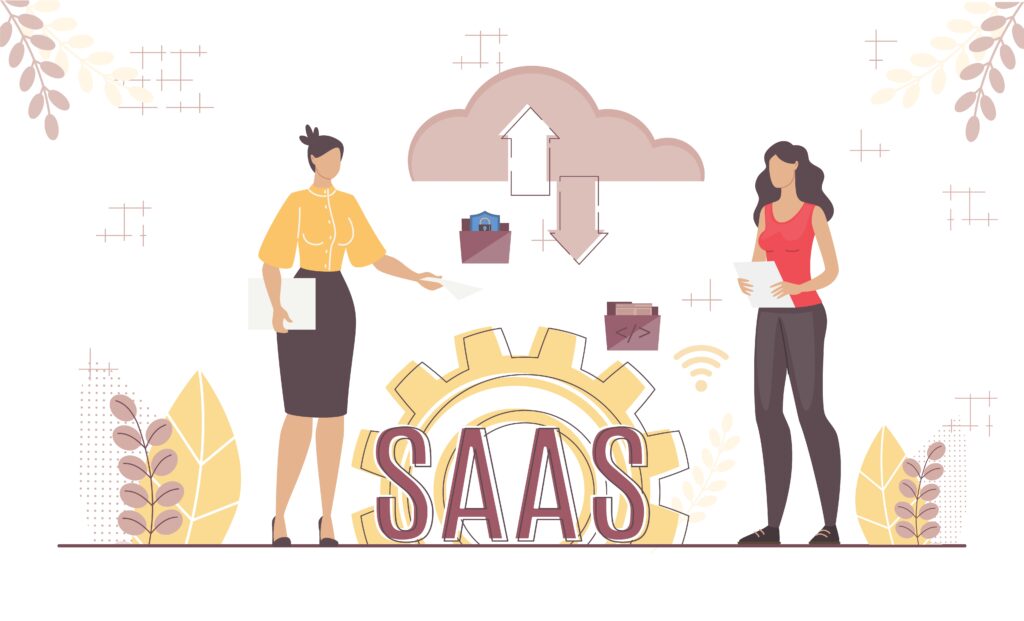In the world of SaaS and tech, there is no larger eyes-on-me trend than AI. What were often considered human-only tasks, such as reasoning or learning, can now be done by AI, technology that simulates human-like solving capabilities. Just as AI is becoming more rooted in today’s society, it’s becoming a standard fixture in the SaaS industry. It has become imperative for companies to incorporate AI, whether in externally facing products or internally, as businesses are expected to do more with less. This article will discuss what SaaS is, how AI can improve the workflow of today’s SaaS companies, and what steps small businesses can take to be AI-driven.
What is SaaS?
SaaS, or software-as-a-service, is a tool used by companies to provide online software to users, so you don’t need to run or install applications on your own computer. Typically, everything is available online, and you can access the software anywhere, anytime. Because the software is hosted on external servers (i.e., the cloud) and maintained by the service providers, users don’t have to worry about setting up infrastructure or maintaining product updates.
The emergence and growth of the industry have transformed how people use software. By reducing upfront costs and making powerful tools accessible to small and big organizations, SaaS platforms have become essential to the modern workflow.
Introducing AI into Saas
In 2022, AI became part of everyday life when OpenAI released ChatGPT, a conversational AI built with large language models (LLMs). Though AI has been making progress for some time, it wasn’t until GenAI entered the scene that AI shifted from being a silent force to a front-facing creative partner. GenAI democratized AI, making it more interactive, bettering innovation, and reenergizing tech investment. AI is one of the biggest trends that’s transforming the SaaS industry. By integrating AI into a company’s software, it can enhance product capabilities, improve user experiences, and drive smarter decision-making. With the democratization of pre-trained models, companies can build their own applications while leveraging existing models, all of this without needing the in-depth knowledge of building actual AI tech from scratch. This integration of AI into SaaS platforms showcases a trend where software is no longer just a tool, but a proactive partner with the ability to evolve alongside user needs. As AI models become more accessible and powerful, a new standard for innovation and value presents itself.

In the SaaS industry, integrating AI into a company’s workflow allows a company to get better value from its data. Companies can improve their data intelligence, making it easier to investigate emerging user interests and behavior faster, forecast with better accuracy, and improve internal operations. When a company derives more value from its data, it improves its ability to automate and personalize services. By adding increasing levels of personalization to a product through continued examination of stakeholder feedback, SaaS companies can reduce the friction between the users and the product by anticipating what users want, offering timely solutions, and streamlining interactions. This creates more meaningful and relevant experiences that are in line with user expectations. This builds stronger user relationships and drives business growth. Additionally, it can contribute to higher conversion rates and increased engagement. By going beyond the one-size-fits-all mentality and delivering value that resonates with multiple user groups, the ability to personalize becomes a strategic advantage. Ultimately, what AI offers SaaS and other industries is scalability. Whether a company needs a new way to handle increasing data volumes or expand to new markets, most AI-based technology gives companies the flexibility to scale without needing to build or house significant infrastructure investments.
Use AI to Build a Better Product
In the SaaS industry, integrating AI into a company’s workflow allows a company to get better value from its data. Companies can improve their data intelligence, making it easier to investigate emerging user interests and behavior faster, forecast with better accuracy, and improve internal operations.
When a company derives more value from its data, it improves its ability to automate and personalize services. By adding increasing levels of personalization to a product through continued examination of stakeholder feedback, SaaS companies can reduce the friction between the users and the product by anticipating what users want, offering timely solutions, and streamlining interactions. This creates more meaningful and relevant experiences that are in line with user expectations. This builds stronger user relationships and drives business growth. Additionally, it can contribute to higher conversion rates and increased engagement. By going beyond the one-size-fits-all mentality and delivering value that resonates with multiple user groups, the ability to personalize becomes a strategic advantage.
Ultimately, what AI offers SaaS and other industries is scalability. Whether a company needs a new way to handle increasing data volumes or expand to new markets, most AI-based technology gives companies the flexibility to scale without needing to build or house significant infrastructure investments.
Roadmap to Adopting AI
Connecting software to different AI tools and technologies lets companies expand the capabilities of their product while maximizing efficiency and effectiveness. And because of how accessible AI is, large corporations aren’t the only businesses that can take advantage of this tech. Building a roadmap that integrates AI doesn’t require a massive upfront investment or a team of highly trained data scientists—what companies need is a thoughtful, phased approach, such as the one outlined below.
- Identify and understand the problems you want AI to solve. Is it about improving customer support? Do you have too much data to parse out manually? Or perhaps you’re looking to optimize your calendar or automate repetitive tasks? By truly understanding what you want AI to help you achieve, you will have better odds of accelerating your company’s AI adoption.
- Choose the right platform to leverage pre-trained models. Creating, setting up, and training your own AI models can be time-consuming and require quite a bit of expertise—expertise that you may not have the time or money for. Hence, the importance of pre-trained models. Many companies have pre-trained models that have been tailored to specific industries or business needs. Additionally, these pre-trained models can be deployed quickly while also providing user-friendly interfaces.
- Check your integration. Given all the innovation that AI has undergone since the release of ChatGPT, many AI platforms have improved to the point where they are built to integrate seamlessly with many systems. However, that does not mean that every platform can integrate with every system. You’ll want to ensure that your chosen AI platform can integrate with your existing system to minimize disruption and allow for smooth adoption.
- Train your team to understand AI and how to use your platform. AI has been democratized, and it’s easier to access, use, and understand. And even though you don’t need an AI expert to utilize it properly, you still want your team to understand the technology, its features, and its limitations to leverage it effectively.
- Start small and scale gradually. Start with pilot projects to test your chosen AI’s impact on small areas of your business. Observe the results, and once you’ve assessed the impact and changes, you can begin to scale AI implementation to other, larger aspects of the business. By starting small, you ensure that the integration of AI is a positive one. Should it not be a positive experience, you have the option to quickly scale back.
By approaching AI adoption with a clear plan, small SaaS businesses can build a foundation for long-term success. Start small, ensure a process of constant feedback and learning, and align each step with your business goals. This will help ensure that AI becomes a value-driven asset as opposed to a liability.
As AI continues to evolve in capability, its role in the SaaS industry is essential to growth and improvement. AI is reshaping what’s possible for businesses of all sizes, and for those companies that are ready to innovate, AI opens up a path to greater agility, scalability, and long-term value. AI is no longer a competitive edge, it’s the new standard.
Adrienne is passionate about transforming processes and driving innovation through smarter, more efficient methods. With a strong foundation in data and research, she has developed a deep expertise in leveraging AI to foster creativity and maximize efficiency.Her extensive experience in research and economic development has been instrumental in honing these skills. From analyzing complex data sets to forecasting industry trends, Adrienne has consistently applied AI-driven techniques to deliver actionable insights and streamline decision-making. This hands-on expertise extends to using innovative approaches in day-to-day challenges, helping organizations and teams tackle problems more effectively and achieve lasting impact.


